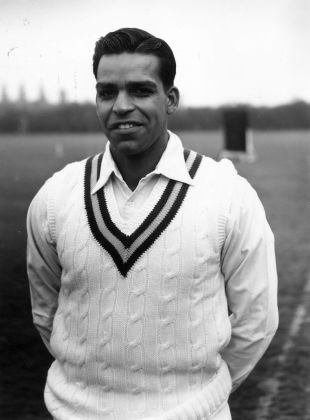Imtiaz Ahmed

|
|||
IMTIAZ AHMED, who died on December 31, five days before his 89th birthday, was a mainstay of Pakistan's early Test teams: he played in their first 39 matches, from 1952-53, until missing one in England in 1962. He was an attacking batsman - a good driver and hooker - and a dependable wicketkeeper who took seven catches off Fazal Mahmood in one of Pakistan's greatest triumphs, the victory at The Oval to square their first series in England, in 1954. Imtiaz finished that trip with 87 first-class victims, a record for a touring keeper that is unlikely to be beaten.
He was born in 1928 in Lahore. Early coaching came from his father, also a wicketkeeper, who drummed in the importance of the stance, ideally moving only one of the feet to collect the ball. Imtiaz preferred standing back to the seamers, and recalled dropping just one chance off Faza (Denis Compton on 13), when he stood up to him at Trent Bridge in 1954, as Fazal's pace was down because of an injury.
Compton went on to 278. Imtiaz played four Ranji Trophy matches for Northern India before Partition, and hit an unbeaten 138 against Lindsay Hassett's Australian Services team in October 1945, when he shared a seventh-wicket stand of 268 with his future Test captain, Abdul Hafeez Kardar. After the creation of Pakistan in 1947, Imtiaz stayed in Lahore, and in 1948-49 made 76 and 131 while opening in the first official match played by the new national team, against the West Indian tourists. Three years later, in Karachi, he top-scored with 43 in the first innings against MCC, in a game Pakistan eventually won by four wickets, helping their bid for Test status.
The previous season, Imtiaz had made what remained his highest score, in unusual circumstances. He was one of three Pakistanis invited to play for the Indian Prime Minister's XI against the Commonwealth XI touring team in Bombay, and things were not looking good when his side were forced to follow on. But Imtiaz went on the counterattack, and had reached 263 when he was hit in the face by a ball from the Kent off-spinner Ray Dovey.
He retired hurt, but returned later to take his score to 300 not out. Pakistan attained Test status in 1952-53, and Imtiaz was among the first on the teamsheet for the inaugural tour of India. To start with, their wicketkeeper was 17-year-old Hanif Mohammad, but Kardar realised Hanif was going to be his leading batsman, and Imtiaz was given the gloves from the Fourth Test. He kept them for the rest of the 1950s, and beyond. It led to his being shuffled up and down the batting order - his only Test double-century, 209 against New Zealand at Lahore in 1955-56, came from No. 8 - but Imtiaz was not one for complaining. In the West Indies in 1957-58, he was asked to open at Kingston, and kicked off the Third Test with a superb 122 against an attack led by the ferocious Roy Gilchrist, although his efforts were rather forgotten when Garry Sobers scorched to 365 not out. The following season, back in Pakistan, the 12-year-old Majid Khan was inspired by the sight of Imtiaz hooking another speedy West Indian, Wes Hall.
After Kardar retired, Imtiaz captained Pakistan against England in 1961-62, before being shoved aside in favour of the Oxford Blue Javed Burki for the subsequent tour of England. Burki, only 23 when that trip started, was taken aback: "Imtiaz was head and shoulders above everyone in terms of character, respect of fellow players, standing in the game and general reputation. I thought he was the best captain I had ever played under."
Injury meant Imtiaz finally missed a Test - the Third at Leeds - in a forgettable tour for Pakistan. They had no more fixtures for 26 months, by which time his long career was finally over. Imtiaz served for many years in the Pakistan Air Force, rising to the rank of wing commander, and filled several coaching and administrative roles: he was chairman of the Test selectors from 1976 to 1978, the year he managed the team which toured England under Wasim Bari. Imtiaz was eventually given a lifetime achievement award by the Pakistan board. He had become Pakistan's oldest surviving Test cricketer when Israr Ali died at the start of 2016, a distinction passed to Wazir Mohammad, the oldest of the famous brotherhood.

